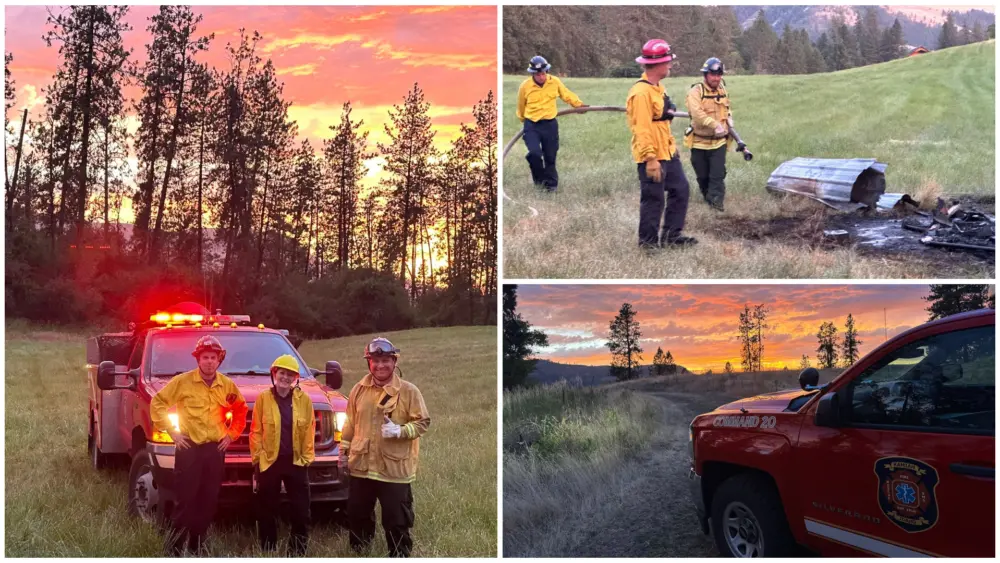BOISE – During the holiday season, online criminals increasingly target Idahoans through online scams and fraud schemes. Today, U.S. Attorney Josh Hurwit, along with the FBI, the Idaho State Police, the Ada County Prosecutor’s Office, the Ada County Sheriff’s Office, the Boise Police Department, the Meridian Police Department, and the Garden City Police Department, released a fourth PSA as part of their joint “Don’t Click December” Consumer Protection Campaign. The Canyon County Sheriff’s Office, Idaho Attorney General’s Consumer Protection Division, AARP Idaho, and the Better Business Bureau also participated in the announcement.
The campaign advises members of the public to exercise skepticism and caution when receiving unsolicited online, email, pop-up, or text communications from unknown or unverified sources. If there is any doubt about a link, message, or attachment, law enforcement cautions: “don’t click it.”
In the fourth and final PSA, available here, Ada County Sheriff Matt Clifford, FBI Supervisory Special Agent David Bodily, and U.S. Attorney Hurwit warn the public about the “phantom hacker” scam and explain some of the ways in which individuals can protect themselves.
The “phantom hacker” scam is a relatively new scheme that is particularly complex and devious. First, scammers send unsolicited messages by phone, email, text, or pop-up pretending to be “tech support,” and asking you to provide access to your computer so software can be updated to thwart hackers. But once the scammers access to your computer, they instead install software to steal your financial information. Then they send messages pretending to be your financial institution, saying that your accounts have been hacked and you need to move your money to a third-party account for “safety.” Sometimes the scammers even pretend to be the government or law enforcement and send messages that your money is still unsafe and needs to be moved to a new “alias” account.
This scam draws victims in using entities you typically trust: Like tech support, financial institutions, and law enforcement. Each step builds the scam to bilk people out of thousands of dollars.
Don’t click it. Protect yourself from the “phantom hacker” scam: do not click on unsolicited pop-ups, links sent via text messages, email links, or attachments. Do not contact the telephone number provided in a pop-up, text, or email. Do not download software at the request of an unknown individual who contacted you. Do not allow an unknown individual who contacted you to have control of your computer. Remember, the Government will never ask you to send money via wire transfer, cryptocurrency, or gift cards.
This four-part series of PSAs, released in the weeks leading up to Christmas, is an effort to alert the public to common online fraud schemes that Idaho law enforcement has seen affect Idahoans.
Unfortunately, these are not the only schemes affecting the public, and new schemes arise all the time. Law enforcement hopes that the “Don’t Click December” Consumer Protection Campaign will raise public awareness and encourage individuals to talk to their friends and relatives about not clicking suspicious links, texts, messages, pop-ups, or attachments.
“Everyday Idahoans are targeted by online scammers, and this activity spikes during the holidays in December,” said U.S. Attorney Hurwit. “But we are not helpless. Through our Don’t Click December videos, we point out some of the red flags that individuals can spot to protect themselves and their loved ones. And we also want to encourage people to report online scams to law enforcement so that we can recover lost money and hold the perpetrators accountable. We are all in this together.”
“Last year, the FBI’s Internet Crime Complaint Center received 800,944 complaints about suspected internet crimes. That’s more than 2,000 complaints every single day,” said David Bodily, Supervisory Special Agent of the Salt Lake City FBI’s Boise Resident Agency. “As cyber scams continue to increase in scope and sophistication, it’s important that law enforcement and the public work together to stay ahead of the risks.”
“When people on the internet ask you for any kind of information, our advice is to stop and think – why are they asking? Does it make sense?” said Ada County Sheriff Matt Clifford. “Just pausing for a beat and doing some critical thinking is probably the best thing you can do to prevent online crime.
The U.S. Attorney’s Office and its law enforcement partners recognize that we all must work to eliminate the stigma individuals may experience if they are victimized. There is no shame to falling victim to an online scheme, which are often designed by professional criminals, sophisticated, and tested repeatedly across the country.
For this reason, the “Don’t Click December” Consumer Protection Campaign also publicizes ways to report scams and incidents of fraud to the FBI and local law enforcement.
To learn more about these and other scams targeting Americans visit FBI.gov, and if you believe you are the victim of a scam, take action by reporting it to FBI’s Internet Crime Complaint Center at IC3.gov or by contacting your local law enforcement agency.




